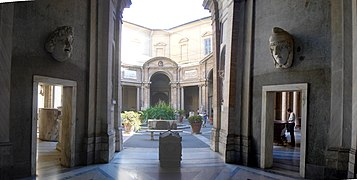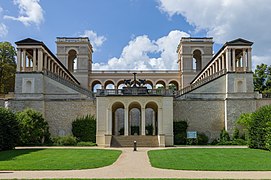Belvedere (structure)


A belvedere /ˈbɛlvɪdɪər/ or belvidere (from Italian for "beautiful view") is an architectural structure sited to take advantage of a fine or scenic view.[1] The term has been used both for rooms in the upper part of a building or structures on the roof, or a separate pavilion in a garden or park. The actual structure can be of any form or style, including a turret, a cupola or an open gallery.[2] The term may be also used for a paved terrace or just a place with a good viewpoint, but no actual building.
It has also been used as a name for a whole building, as in the Belvedere, Vienna, a huge palace, or Belvedere Castle, a folly in Central Park in New York.
Examples
[edit]On the hillside above the Vatican Palace (c. 1480–1490), Antonio del Pollaiuolo built a small pavilion (casino in Italian) named the palazzetto or the Belvedere for Pope Innocent VIII. Some years later Donato Bramante linked the Vatican with the Belvedere, a commission from Pope Julius II, by creating the Cortile del Belvedere ("Courtyard of the Belvedere"), in which stood the Apollo Belvedere, among the most famous of antique sculptures. This began the fashion in the 16th century for the belvedere.
Gallery
[edit]-
A carousel in the Cortile del Belvedere, 1565
-
Belvedere in the park of the Glienicke Palace, in Berlin
-
Johnson's Belvedere, "Tower of Baaa" in Findlay, Illinois
-
Gloriette de Buffon in the Jardin des plantes in Paris
-
Haldon Belvedere, in Devon, UK
-
Patio of the Cortile del Belvedere in the Vatican
-
Belvedere of Queen Anne's Summer Palace in the garden of Prague Castle (1538–1560)
-
Belevedere of the Villa Spada in Bologna
-
Belvedere Castle, Central Park, New York
-
The Belvedere, Plymouth Hoe
See also
[edit]- Belvedere (M. C. Escher), a picture by M. C. Escher which shows an impossible belvedere
- Gazebo
- Gloriette
- Widow's walk
General references
[edit]- Roth, Leland M. (1993). Understanding Architecture: Its Elements History and Meaning. Oxford, UK: Westview Press. pp. 342–3. ISBN 0-06-430158-3.
Citations
[edit]- ^ "Belvedere". Encyclopædia Britannica. Retrieved 6 July 2017.
- ^ "Belvedere bell ve DEER". Illustrated Architecture Dictionary. buffaloah.com. Retrieved 6 July 2017.
External links
[edit] The dictionary definition of belvedere at Wiktionary
The dictionary definition of belvedere at Wiktionary















